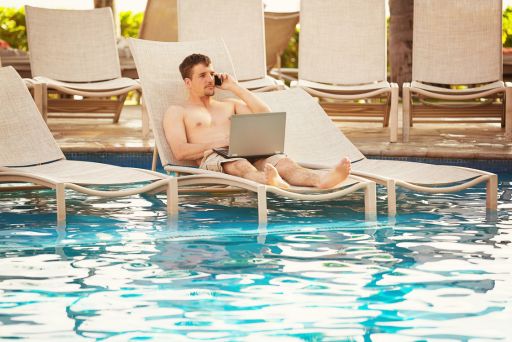How to Turn a Vacation into a Business Trip can be a savvy way to maximize your time and minimize expenses. By strategically incorporating business-related activities into your travels, you can potentially deduct many of your expenses while still enjoying some leisure time. This article will guide you through the process of transforming your vacation into a business trip, exploring the tax implications, documentation requirements, and strategies for making the most of your journey.
Understanding the Concept

What is a Business Trip?
A business trip is a journey undertaken for work-related purposes. It typically involves attending meetings, conferences, training sessions, or other activities directly related to one’s occupation. Unlike personal travel, the primary purpose of a business trip is to conduct business rather than for leisure or recreation.
Benefits of Combining Business and Leisure
Integrating business activities into your vacation can offer several advantages:
- Tax Deductions: By treating a portion of your trip as business-related, you may be able to deduct expenses such as travel, lodging, meals, and transportation.
- Maximized Time: Turning a vacation into a business trip allows you to make productive use of your time by engaging in professional activities while away from home.
- Networking Opportunities: Business trips often provide opportunities to network with colleagues, clients, and industry professionals, which can be beneficial for your career or business.
IRS Guidelines
To begin, let’s review some directives outlined by the IRS concerning travel expenditures. According to the IRS, travel expenses must meet the criteria of being both ordinary and necessary. They should not be characterized by lavishness, extravagance, or intended for personal use.
Deductions for business-related travel may be permissible when an individual is required to travel away from their tax home or primary workplace for business-related purposes. An individual is considered away from home when their absence extends beyond a typical workday, necessitating overnight accommodation to fulfill work obligations while away.
Moreover, travel expenses incurred for conventions are eligible for deduction provided that attendance at the event directly benefits the business.
When conducting business travel within the United States, there are various scenarios to consider. The primary purpose of the trip may either be business-related or for leisure. Each scenario warrants different deductions, prompting a separate examination of each case.
Business Trips with a Solely Business Focus
For journeys dedicated entirely to business, it’s essential that your clients establish a clear prior business purpose by arranging appointments and defining business objectives before your departure. When your trip is exclusively for business purposes, the IRS affirms that travel expenses incurred on your behalf are fully deductible. This encompasses all expenses related to transportation by air, rail, road, or other means between your residence and your business destination.
Additionally, other deductible expenses encompass:
- Taxi fares or alternative modes of transportation.
- Shipment of luggage, samples, or presentation materials.
- Utilization of your personal vehicle for business excursions.
- Accommodation and non-entertainment meals (with 50% of meal costs eligible for deduction).
- Dry cleaning and laundry services.
- Business-related calls and communications.
- Gratuity payments for services associated with any of the aforementioned expenses.
- Any other similar ordinary and necessary expenses linked to this business travel.
To ensure the deductibility of these items, it’s imperative to document the purpose of the travel meticulously and retain proper receipts for all incurred expenses.

When Combining Business and Personal Travel
When blending business with personal travel, it’s important to discern which expenses are deductible based on the primary purpose of the trip. If your journey primarily serves business purposes but includes personal elements such as vacations or side trips, you can only deduct expenses directly related to the business portion of the travel. Weekends, holidays, and standby days between business days may be counted as business days by the IRS if they fall within the trip duration, except when they follow business activities and are spent on personal pursuits.
For instance, if you’re at a business destination from Friday to Monday, with business scheduled for both days, the weekend is considered business days even if you engage in non-business activities. However, if your business concludes on Friday and you opt to stay for the weekend, expenses incurred after the business activities cease are not deductible.
When traveling for business and your family accompanies you, only expenses attributable to your participation are deductible. For instance, if traveling by vehicle, the entire cost is deductible since it’s incurred regardless of business or leisure use. However, for air travel, only your airfare is deductible. Similarly, for lodging expenses, only the cost of a single room, not a double room, is deductible.
To substantiate these deductions, maintain proper documentation showing the single room rate and only deduct 50% of non-entertainment meals related to your individual expenses, not those of the entire family. Unfortunately, trips primarily for personal reasons or vacations are entirely nondeductible. However, if conducting business during personal travel, only expenses directly related to the business activities are deductible.
How to Ensure That Your Travel Qualifies as a Business Trip
1. You Must Depart From Your Tax Home
Your tax home refers to the location where your business operates. Traveling for work doesn’t officially constitute a “business trip” until you depart from your tax home for a duration longer than a standard work day, with the intention of conducting business elsewhere.
2. The Majority of Your Trip Must Involve Business Activities
The IRS calculates your time away in terms of days. For your trip to be classified as a business trip, you must dedicate most of your time to business-related endeavors.
For instance, if you’re away for a week (seven days) and spend five days meeting with clients while enjoying a couple of days at the beach, it qualifies as a business trip.
However, if you spend three days meeting with clients and four days at the beach, it’s considered a vacation. Fortunately, the days you travel to and from your destination count as work days.
3. Expenses Incurred Must Be “Ordinary and Necessary”
The term “ordinary and necessary” is used by the IRS to describe expenses that are typical for a business within its industry and essential for conducting business activities.
For instance, if there are two conferences—one in Honolulu and the other in your hometown—you can’t deduct the expenses of an all-expense-paid trip to Hawaii.
Similarly, if you require a rental car for transportation, you may have difficulty deducting the cost of a Range Rover when a Toyota Camry would suffice.
Determining what qualifies as “ordinary and necessary” can sometimes be ambiguous, and there may be a temptation to manipulate it. Our advice is to err on the side of caution. If the IRS investigates and finds that you claimed an unnecessary expense, you could face severe penalties.
4. The Trip Must Be Planned in Advance
You can’t simply arrive at Universal Studios, distribute business cards to everyone you encounter in the roller coaster line, label it as “networking,” and deduct the trip’s expenses from your taxes. A business trip must be arranged in advance.
Before your departure, outline your daily itinerary, schedule, and who you’ll be meeting with. Document your plans in writing prior to leaving. If feasible, send a copy via email to someone to obtain a timestamp. This documentation helps demonstrate the professional intent behind your trip.

Key Considerations
Establishing a Business Purpose
To qualify for tax deductions, your trip must have a prior set business purpose. This means you should have planned business activities scheduled before departing on your journey. These activities could include attending meetings, visiting clients, conducting research, or participating in training seminars.
Documentation Requirements
The IRS requires proper documentation to support your business travel expenses. This includes maintaining records of your itinerary, business appointments, receipts, and any other relevant documentation. Failure to keep accurate records could jeopardize your ability to claim deductions and may result in tax penalties.
Distinguishing Between Business and Personal Expenses
It’s essential to distinguish between expenses that are directly related to your business activities and those that are purely personal in nature. While business-related expenses are typically tax deductible, personal expenses are not. Be sure to allocate costs appropriately to avoid any potential issues during tax filing.
Strategies for Turning Your Vacation into a Business Trip
1. Plan Ahead
Before embarking on your trip, take the time to plan your itinerary and identify opportunities for business-related activities. Schedule meetings, conferences, or other engagements that align with your professional objectives.
2. Mix Business with Pleasure
Find ways to incorporate business activities into your leisure time. For example, you could schedule client meetings at a scenic location or attend a networking event in a vibrant city. By blending business with pleasure, you can enjoy the best of both worlds.
3. Keep Detailed Records
Maintain meticulous records of your expenses and activities throughout your trip. Save receipts for meals, lodging, transportation, and any other expenditures incurred during your travels. These records will serve as evidence to support your tax deductions.
4. Understand Tax Regulations
Familiarize yourself with the tax regulations governing business travel deductions. The IRS has specific rules regarding what expenses are eligible for deduction and under what circumstances. Consulting with a tax professional can help ensure compliance with applicable tax laws.

Conclusion
Transforming a vacation into a business trip can be a smart strategy for saving money and maximizing productivity. By planning ahead, keeping detailed records, and understanding the tax implications, you can turn your travels into valuable business opportunities. Whether you’re a business owner, self-employed professional, or employee, taking advantage of tax deductions for business travel can help you minimize expenses and maximize tax savings. With careful planning and proper documentation, you can make the most of your next vacation while staying financially savvy.
FAQs for Turning a Vacation into a Business Trip
Can I Deduct Expenses if My Trip Involves Both Business and Personal Activities?
Yes, you can deduct expenses related to the business portion of your trip. However, only expenses directly linked to business activities are eligible for deduction.
How Can I Determine Which Expenses Are Deductible During a Blended Business and Personal Trip?
Expenses must be attributable to the primary purpose of the trip. For instance, if you travel primarily for business and your family joins, only your expenses are deductible.
Are Weekends and Holidays Counted as Business Days for Tax Deduction Purposes?
Weekends, holidays, and standby days between business days can be counted as business days by the IRS if they fall within the trip duration. However, if they follow business activities and are spent on personal pursuits, they aren’t deductible.
What Documentation Should I Maintain to Support Business Travel Expenses?
Keep detailed records of your itinerary, business appointments, receipts, and any other relevant documentation to substantiate your business travel expenses.
Can I Deduct Expenses for a Trip That Mixes Business and Pleasure?
Yes, you can deduct expenses directly related to the business portion of your trip. However, expenses incurred during personal or leisure activities are not deductible.

